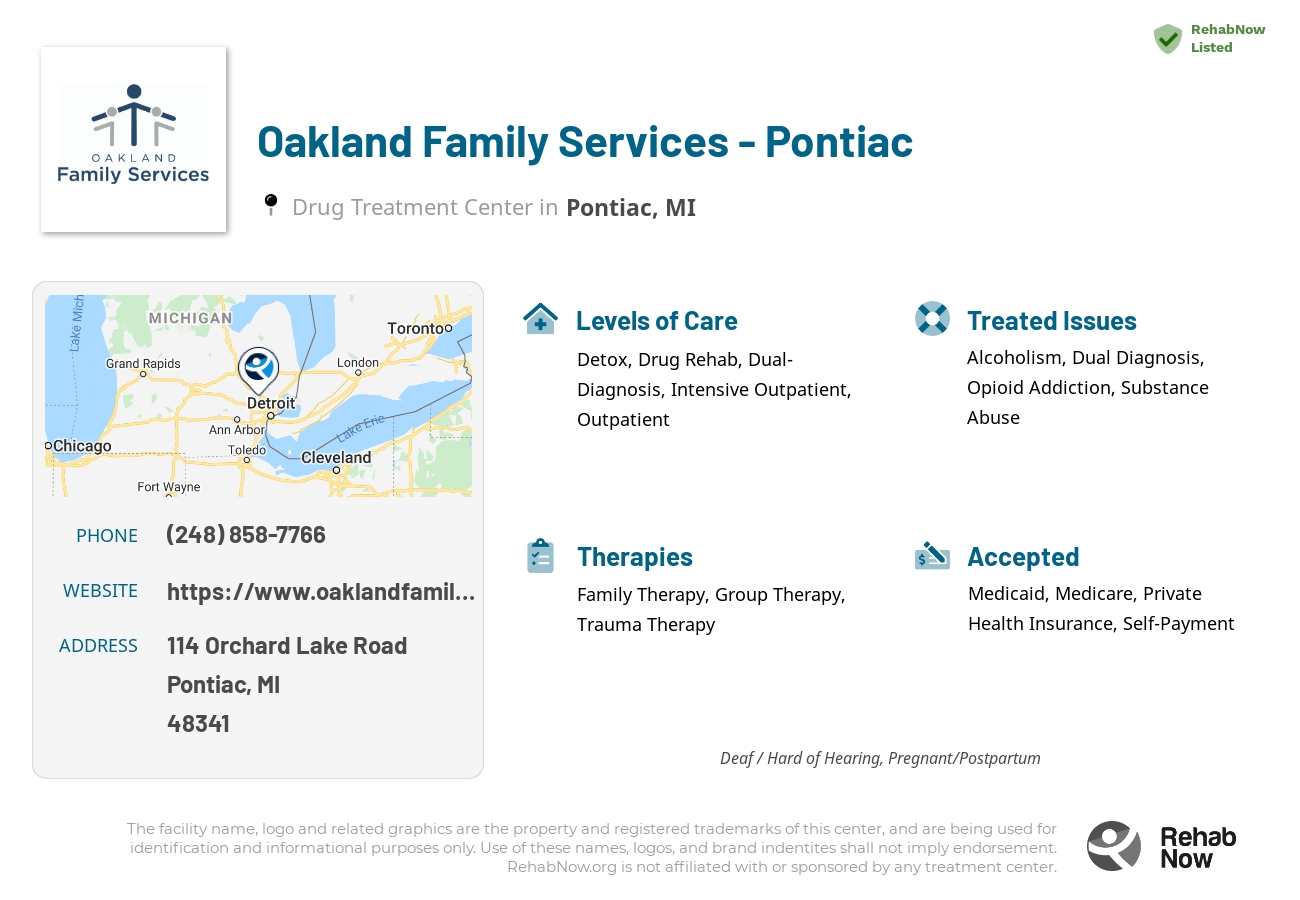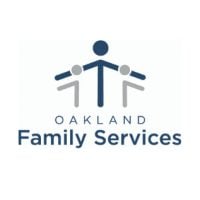
Oakland Family Services - Pontiac
Drug Rehab Center in Pontiac, Michigan
- Substance Abuse
- Opioid Addiction
- Dual Diagnosis
- Drug Addiction
- Alcoholism
Oakland Family Services - Pontiac is a licensed Ambulatory Health Care Center that offers a range of services, including mental health and substance abuse treatment and prevention, counseling, substance abuse education, advocacy, and supportive services, with an emphasis on the whole person.
About This Michigan Facility
Oakland Family Services - Pontiac in Pontiac, Michigan is a comprehensive care facility dedicated to providing integrated services and supports for individuals, families, and children in need. It offers a range of services, including mental health and substance abuse treatment and prevention, counseling, substance abuse education, advocacy, and supportive services. The facility offers a comprehensive outpatient program that combines evidence-based treatment and services with an emphasis on the whole person.
Oakland Family Services - Pontiac provides specialized treatment for individuals and families affected by addiction and substance abuse. Treatment approaches are uniquely tailored to meet the needs of each individual, including evidence-based therapies such as cognitive-behavioral therapy (CBT) and motivational interviewing. Additional therapeutic approaches may include trauma-informed care, family systems work and recovery support services. Oakland Family Services also offers educational and supportive group sessions, individual counseling and case management services.
Oakland Family Services - Pontiac is a licensed Ambulatory Health Care Center and holds a Certificate of Waiver issued by the Substance Abuse and Mental Health Services Administration (SAMHSA). The facility is also certified by the Office of Substance Abuse Services and is accredited by the Joint Commission, an independent, non-profit organization that evaluates and accredits health care organizations and programs in the United States. Oakland Family Services - Pontiac is committed to providing outstanding services and cares for those affected by addiction and substance abuse.

Genders
Ages
Modality
Additional
Conditions and Issues Treated
Substance Abuse Treatment is important when getting sober, as it helps addicts learn the skills they need to live a clean life. There are many different kinds of recovery treatment, including medication-assisted therapy, behavioral therapeutic approaches and self-help groups, as well as counseling.
Opioid abuse has become a national epidemic in the last decade. The US has one of the world’s highest rates of opioid use and abuse, as well as opioid-related deaths. Opioids are classified as Schedule II-IV controlled substances in the US due to their high potential for abuse.
Oxycodone, hydrocodone, methadone, and fentanyl are the most common Opioids and are commonly prescribed to treat pain. Tolerance to opioids develops over time, making life difficult, if not impossible, without them. Opioid users often obtain the drugs illegally. They can be drug dealers, friends, or family members who do not have valid prescriptions.
The desire for a more intense high than prescription opioids can quickly lead to heroin use. Heroin users are more prone to illness and death due to the high risk of overdose.
Many opioid addicts who seek treatment believe that the only way to overcome their addiction is through medical detox and long-term drug addiction rehab. To help patients wean off their addiction and reduce the risk of overdose, medication-assisted therapy (MAT) involves prescribing a replacement opioid. Doctors use MAT in conjunction with other anti-craving medications to help patients maintain recovery. Due to the high risk of relapse, MAT is often combined with individual and group counseling and social support programs.
When addiction and psychiatric issues co-occur, the addict’s recovery is more successful when both conditions are treated. A dual diagnosis refers to a condition in which the patient is diagnosed with two health issues: addiction and bipolar disorder. The most common therapies are psychotherapy, behavioral therapy, spiritual counseling, 12-step programs, and medication management.
Levels of Care Offered at Oakland Family Services - Pontiac
This center offers a variety of custom treatment tailored to individual recovery. Currently available are Detox, Drug Rehab, Dual-Diagnosis, Intensive Outpatient, Outpatient, with additional therapies available as listed below.
The detoxification process typically includes some combination of the following: medical supervision, medication to help alleviate withdrawal symptoms, drug testing to monitor progress, and counseling.
Tackling the physical symptoms of withdrawal is essential to ensure that an individual can focus on the psychological aspects of the addiction without focusing on the physical pain that comes with withdrawal.
Withdrawal symptoms can be uncomfortable, even life-threatening, so carefully managing the detox process is extremely important. In many cases, more advanced pharmaceutical interventions are used to treat more severe withdrawal symptoms. Medication might help alleviate discomfort associated with detox, including nausea and headaches.
Intensive outpatient treatment is a form of addiction care that allows patients to continue living at home while undergoing treatment. This type of care is appropriate for patients who have been treated in residential treatment programs. Intensive outpatient programs include regular visits to the facility providing therapy, and patients gradually return to their routine life. IOP benefits most when patients have a supportive family member or friend to help them recover.
The first step to getting into an intensive outpatient program is to attend a detoxification facility. Detoxification facilities are designed to remove substances from the body safely. The patient will attend sessions designed to help them understand their addiction and its impact on their lives. While in an intensive outpatient program, therapy sessions are scheduled three to five times per week, with the patient attending no more than two sessions in one day.
An outpatient treatment program is set up to help with alcohol or drug addiction or a co-occurring disorder. The patient must attend the facility for their therapy and other programs but can return home each night.
The frequency of mandatory attendance decreases after much of Oakland Family Services - Pontiac‘s program is complete.
Outpatient treatment is a recovery approach that allows recovering addicts to live at home while getting rehab for addiction
An outpatient can include day treatments which include attending group sessions one hour per week. A person living in an outpatient environment may be allowed the opportunity to work full time if they choose to and continue studies without interruption from drugs/alcohol.
Outpatient treatment is an option for people who want to maintain their careers and families. Outpatients live at home but attend treatment such as individual counseling, group counseling, or twelve-step meetings during the day.
Therapies & Programs
Family therapy is a crucial part of drug treatment and getting sober. It is one of the most effective ways to help addicts stay on the path to long-term sobriety. An addict’s family can play a vital part in helping them to avoid relapse. They can spot the warning signs and help them get back on track.
In group therapy, recovering addicts meet with a therapist and other people in recovery. Some groups are closed, meaning only people who share the same addiction or problem can attend. Others are open to anyone who wants to stop using drugs or drinking alcohol. Group therapy sessions typically focus on one topic each week or month so that recovering addicts can discuss issues they face daily.
Trauma therapy allows people to face and learn from past traumas.
Many people suffer childhood traumas that lead to adult addiction. During treatment at Oakland Family Services - Pontiac [/type], you can move forward in your recovery and reclaim your sober future! Trauma is a common cause of psychological disorders like Addiction Disorder. It’s common in Addictive Disorders patients because traumatized people have strong emotions or thoughts that lead to addictive behaviors.
Payment Options Accepted
For specific insurance or payment methods please contact us.
Is your insurance accepted?
Ask an expert, call (888) 674-0062
Oakland Family Services Associated Centers
Discover treatment facilities under the same provider.
- Oakland Family Services - Berkley in Berkley, MI
- Oakland Family Services - Pontiac in Pontiac, MI
- Oakland Family Services - Walled Lake in Walled Lake, MI
- Oakland Family Services - Rochester in Rochester, MI
- Oakland Family Services - Walled Lake in Walled Lake, MI
Learn More About Oakland Family Services Centers
Additional Details
Specifics, location, and helpful extra information.
Pontiac, Michigan 48341 Phone Number(248) 858-7766 Meta DetailsUpdated November 25, 2023
Staff Verified
Patient Reviews
There are no reviews yet. Be the first one to write one.
Pontiac, Michigan Addiction Information
Michigan has the second-highest rate of drug and alcohol abuse in the nation. Heroin is linked to more than 50% of the state's hepatitis C cases. Marijuana is the drug most often associated with crimes in Michigan, followed by methamphetamines. Opioids alone are responsible for almost 20% of all drug overdose deaths in Michigan.
Pontiac, Michigan is facing a drug addiction problem that is quickly worsening. In 2017, there were a total of 1,023 drug-related hospitalizations in the city. Over 60% of inmates in local jails are addicted to drugs or alcohol. There are a number of different forms of therapy accessible in Pontiac, MI. Inpatient treatment, outpatient treatment, and 12-step programs are some of the most popular kinds of treatment.
Treatment in Nearby Cities
- Howell, MI (32.3 mi.)
- Auburn Hills, MI (4.8 mi.)
- Mason, MI (58.6 mi.)
- Saint Johns, MI ( mi.)
- Washington, MI (14.4 mi.)
Centers near Oakland Family Services - Pontiac
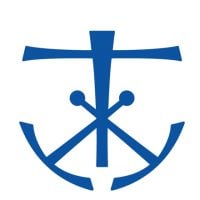
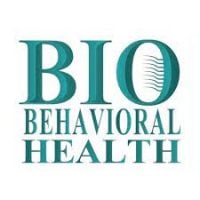
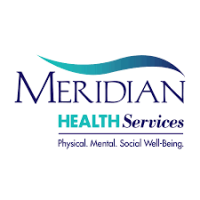
The facility name, logo and brand are the property and registered trademarks of Oakland Family Services - Pontiac, and are being used for identification and informational purposes only. Use of these names, logos and brands shall not imply endorsement. RehabNow.org is not affiliated with or sponsored by Oakland Family Services - Pontiac.

